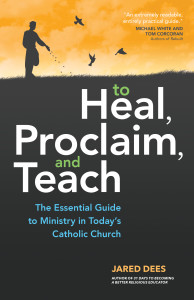Proclaim
When Jesus proclaimed the Good News about the Kingdom of God, he spoke in parables. Why? He said it was because the crowds (those who were not disciples yet) were unable to learn about the mysteries of the kingdom yet. His parables offered familiar symbols and stories that expressed a completely new way of thinking about the world and living in it. These parables expressed the absolutely unbelievable description of the mercy of God.
Throughout the Church’s existence, leaders have distinguished between proclamation (kergyma) and teaching (didache). Pope Francis eloquently summarized the meaning of kerygma in three points: 1) God loves you, 2) he died for you, and 3) he is with you today. At it’s core, the work of proclamation is our words and actions that express those three essential truths. By words and deeds, everyone should experience the good news of the Kingdom of God: God is good…all the time!
Top Takeaways from Chapter 6
We do not teach the unevangelized. We proclaim instead.
Jesus didn’t teach doctrines with his parables; he proclaimed the Good News of the Kingdom through parables.
What is the Kerygma?
The kerygma, the first proclamation, we share the good news that
- Jesus Christ loves you;
- he died for you;
- and he is with you today.
Practice evangelical simplicity.
Living a simple life without a desire for possessions or power, is a away to practice what we preach as Christians.
AMDG: For greater glory of God!
You are imperfect. Stop trying to be perfect. Only God is perfect. Give all the glory to him and let your imperfections unite you with other imperfect people.
Preach a simple message.
If you have the opportunity to proclaim the good news in front of groups, simplify your message as much as possible.
Further Reading
“Why did Jesus speak in parables?”
Jared Dees
“The Conditions of Discipleship”
Jared Dees
“How to Write a Witness Talk”
Jared Dees



